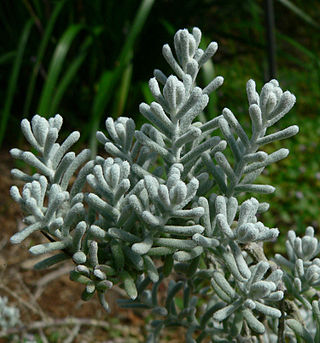
Maireana sedifolia, also known as the bluebush or pearl bluebrush is a compact shrub endemic to Australia, and found in New South Wales, Victoria, South Australia, Western Australia, and the Northern Territory. It is used in pasture and as a garden plant where it is popular due to its distinctive grey foliage.
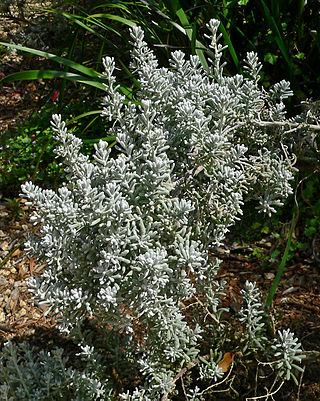
Maireana is a genus of around 57 species of perennial shrubs and herbs in the family Amaranthaceae which are endemic to Australia. Species in this genus were formerly classified within the genus Kochia. The genus was described in 1840 by the botanist, Moquin-Tandon and named to honour Joseph François Maire (1780-1867), an amateur botanist who befriended him during the author's first visit to Paris in 1834.
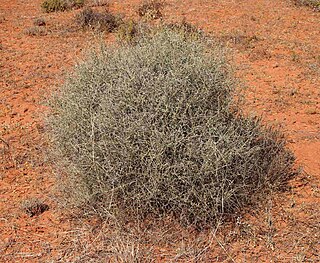
Maireana aphylla, also known as cotton bush or leafless bluebush, is a leafless shrub that is endemic to Australia. It is usually rounded in form and grows to around 1.5 metres in height.

Casuarina cristata, commonly known as belah or muurrgu, is a species of flowering plant in the family Casuarinaceae and is endemic to inland eastern Australia. It is a tree with fissured or scaly bark, sometimes drooping branchlets, the leaves reduced to scales in whorls of 8 to 12, the fruit 13–18 mm (0.51–0.71 in) long containing winged seeds (samaras) 6.0–10.5 mm (0.24–0.41 in) long.
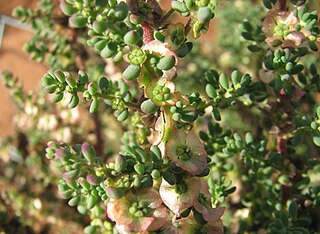
Maireana brevifolia is a shrub that is native to Australia and naturalised in South Africa, the Middle East and the Canary Islands. Common names in Australia include cotton bush, eastern cotton-bush, short-leaf bluebush, small-leaf bluebush and yanga bush. It grows to between 0.2 and 1 metre high. The flower-like fruits are up to 9 mm in diameter and comprise 5 paper-thin wings. It is one of the first species to appear in disturbed saline habitats.

Eremophila georgei is a flowering plant in the figwort family, Scrophulariaceae and is endemic to Western Australia. It is a common, widespread shrub in central areas of the state, often growing on rocky ridges and hillsides and has serrated leaves and mauve, purple or pink flowers.

Eucalyptus georgei, commonly known as Hyden blue gum, is a species of tree or mallet that is endemic to Western Australia. It has smooth bark, glossy green, lance-shaped adult leaves, glaucous flower buds in groups of between seven and eleven, creamy white flowers and conical to cup-shaped fruit.

Maireana pyramidata is a species of plant within the genus, Maireana, in the family Amaranthaceae. It is endemic to Australia, and widespread throughout Australia in the inland, where it is found in Victoria, New South Wales, Queensland, the Northern Territory and Western Australia.

Maireana trichoptera is a plant in the Amaranthaceae family, native to all mainland states and territories of Australia except Queensland.

Maireana thesioides is a plant in the Amaranthaceae family, native to Western Australia.
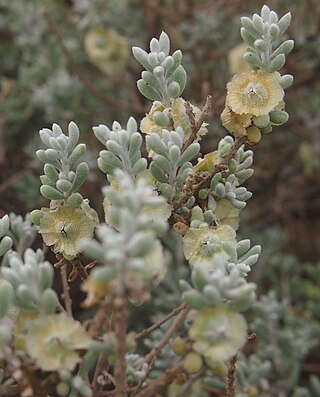
Maireana astrotricha, the low bluebush, is a species of flowering plant in the family Amaranthaceae, native to a southern portion of the Northern Territory, central South Australia, western New South Wales, and adjacent parts of Queensland. It is usually found growing in open habitats, typically in gravelly, well-drained soils.

Maireana carnosa, the cottony bluebush, is a species of flowering plant in the family Amaranthaceae, native to western and central Australia. It is typically found growing in heavy soil, often on the verges of salt lakes.
Maireana convexa, the mulga bluebush, is a species of flowering plant in the family Amaranthaceae, native to Western Australia. It is usually found growing in non-saline soils in the mulga habitat.
Maireana excavata, the bottle bluebush, is a species of flowering plant in the family Amaranthaceae, native to southeastern Australia. A decumbent perennial with a substantial taproot, it is typically found growing in heavy soils.
Maireana glomerifolia, the ball-leaf bluebush, is a species of flowering plant in the family Amaranthaceae, native to Western Australia. It is typically found in dry, saline areas.

Maireana pentagona, the hairy bluebush, is a species of flowering plant in the family Amaranthaceae, native to Australia. A prostrate or decumbent perennial, it typically grows in heavy soils.
Maireana planifolia, the low bluebush, is a species of flowering plant in the family Amaranthaceae, native to western and central Australia. It is found in a wide variety of situations, including sandy areas, rocky slopes, and in the mulga habitat.
Maireana suaedifolia, the lax bluebush, is a species of flowering plant in the family Amaranthaceae, native to Western Australia and South Australia. It is typically found growing in alluvial plains or on sand dunes.

Maireana triptera, the three-wing bluebush, is a species of flowering plant in the family Amaranthaceae, native to Australia. It is a compact shrub reaching 50 cm (20 in), with bluish-green leaves.

Maireana erioclada, commonly known as the rosy bluebush, is a common shrub endemic to Australia, belonging to the genus Maireana.















